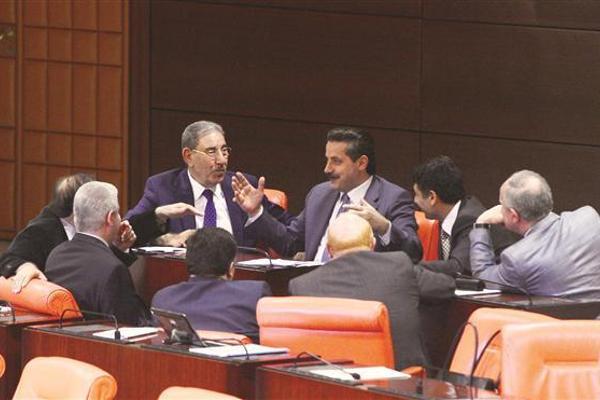Is the AKP changing its election plans?


PM Erdoğan has said the country may head to the ballots three times in 2014. AA photo
After Prime Minister Recep Tayyip Erdoğan said during his U.S. trip that “three ballot boxes might be set up” in 2014, possible scenarios started emerging from Ankara. The ruling Justice and Development Party (AKP) Deputy Chairman Hüseyin Çelik has said there could be local elections in March 2014, presidential elections in August, and a constitutional referendum in November.Was it the sign of a new game plan that Erdoğan, who insists on the presidential system, wants to have a presidential election first and then hold the constitutional referendum? This question automatically comes to mind: “Why doesn’t the AKP try to pass in the Parliament, with the support of the Peace and Democracy Party (BDP), and process for a referendum, a constitutional amendment including the presidential system or a president affiliated with a political party, in the fall of 2013 or between local elections and presidential elections?”
I searched for answers to this question in the AKP corridors. Two main concerns come up to the front in the ruling party’s wing. The first is the reaction that would form in the society with the appearance of making a joint Constitution together with the BDP; and the damage this would cause to the AKP image that has been ruling the country with a constantly increasing voting rate… Even in those surveys AKP is ordering to be conducted, the support for the two parties writing a joint Constitution does not reach 30 percent.
This reality may make it difficult for the AKP to obtain the expected results in secret voting in the Parliament and in the referendum. Despite the fact that the peace process has positive effects, it is estimated that “nationalist” sentiments within the AKP might increase the number of outages that are already expected. It is another factor that might multiply this outage that almost 75 of the deputies and executives within the AKP will not be able to run for office in next elections because of an internal AKP regulation. Also, the stances of those names close to President Abdullah Gül can be indicative in this picture.
The second concern is the dropping of the presidential system (or a president affiliated with a political party) from the constitutional amendment proposal. The article about “making the closing of political parties tougher” in the constitutional amendment package of 26 articles that was taken to a referendum on Sept. 12, 2010 had been withdrawn with the support of the opposition as well as some deputies from the AKP in the secret voting.
These kinds of negative impacts that might be experienced during a constitutional amendment or a constitutional process starting from scratch, with possible negative consequences on the local elections and the Presidential elections, make it difficult for the ruling party to make a decision. Some AKP executives, while talking about the 2014 calendar, point to the fact that their concerns have not been eliminated about scheduling the constitutional referendum after two major elections.
The AKP takes the pulse of the public with monthly surveys. These surveys are guiding in setting up the agenda and timing. The latest surveys contain data that justify these ongoing concerns. According to the KONDA latest survey, AKP has 51.5 percent voting ratio, CHP 21 percent, MHP 14 percent and BDP 8.5 percent. In the previous survey conducted before the Nevruz on March 21, AKP had 52.9 percent, CHP 22 percent, MHP 12.7 percent and the BDP 6.9 percent. While the AKP is supported over 50 percent for the peace process, this figure does not even reach 40 percent for the presidential system. Even some names within the AKP have not been able to be persuaded about the presidential system.
The AKP is debating to shift the referendum date to the fall of 2014 for it not to affect both the local and the presidential elections based on this and other reasons. A decision has not been reached yet because there are also those in the AKP that suggest passing the Constitution bill in the Parliament during the summer months and taking it to a referendum in the fall. That segment is hoping to benefit from the positive picture of the peace process. Those who defend a third way argue that it would be correct to conduct the local election on time and elect Erdoğan as president on August 2014. Then walk through the 2015 elections with a trusted temporary prime minister and leave the new constitution that would include the presidential system to the new Parliament.
Erdoğan and his top aides will clarify their game plan before the beginning of July in the light of these debates. My impression is that despite all kinds of concerns within the party, Prime Minister Erdoğan, in the case that he has the supports he is expecting, will take the risks and try taking the “presidential system” formula to the people.
